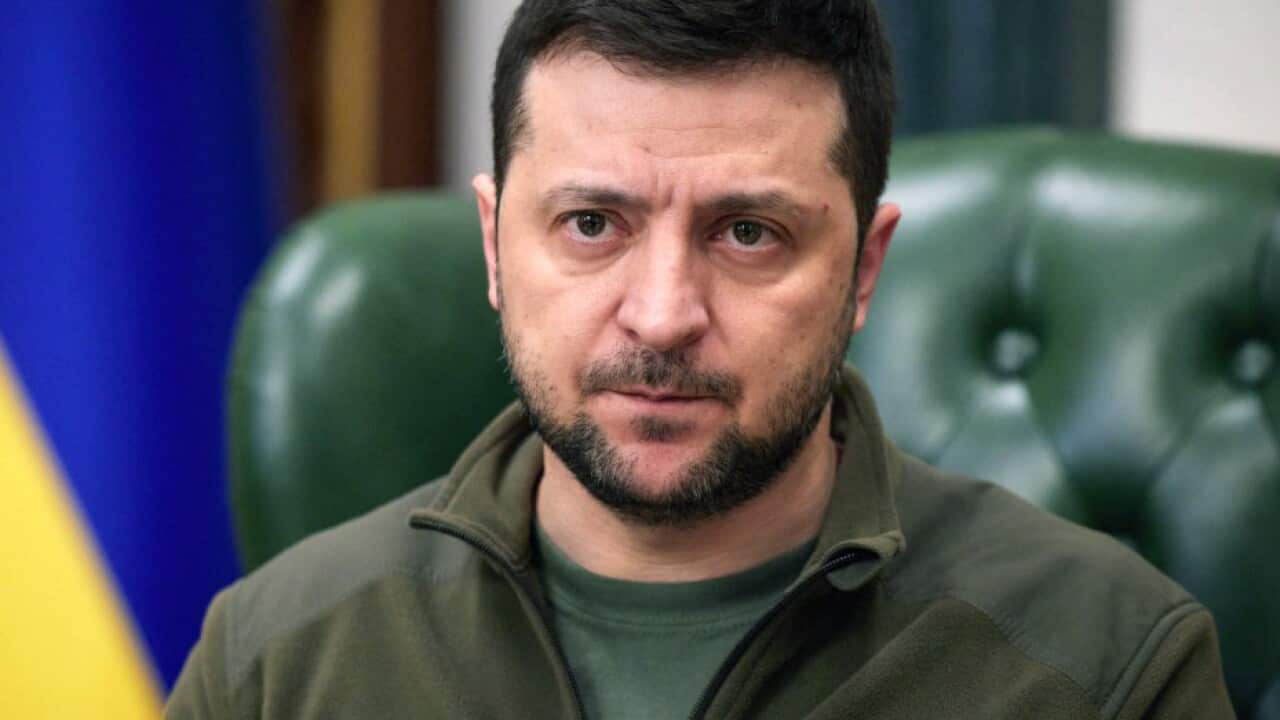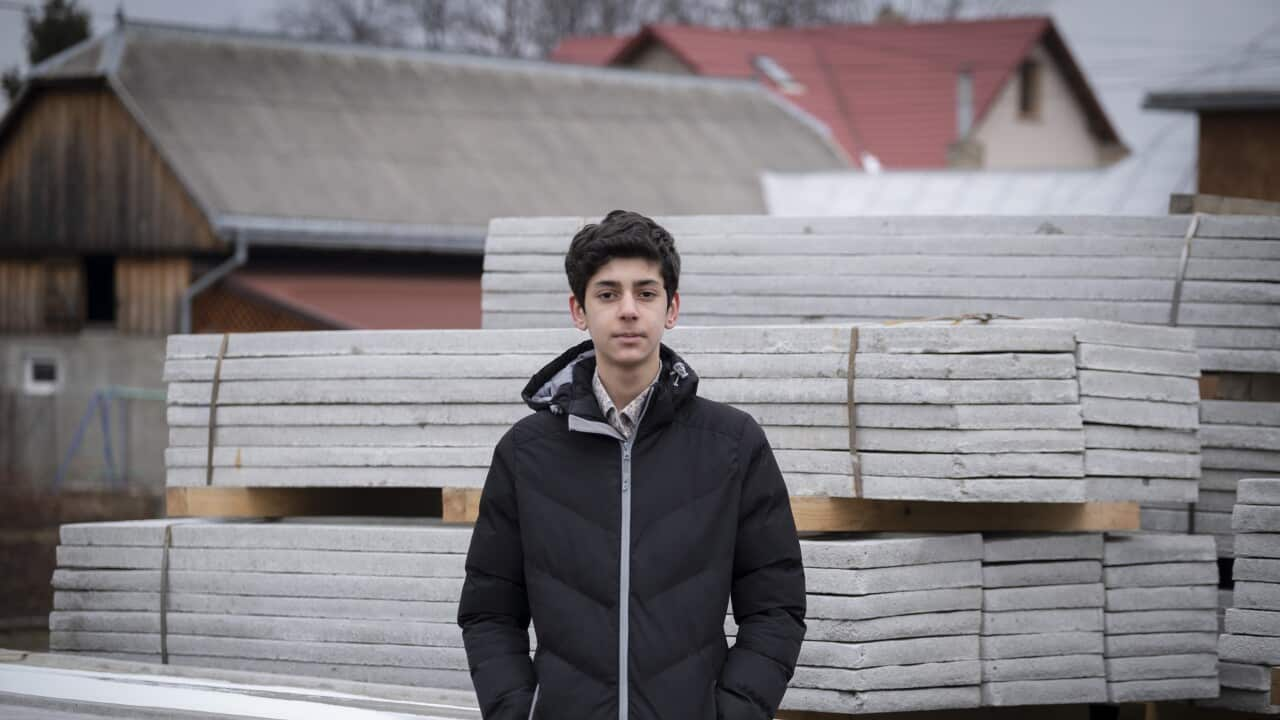Ukrainian President Volodymyr Zelenskyy has warned NATO that its member states could soon be attacked by Russian forces after an air strike hit a Ukrainian military base close to the Polish border.
Meanwhile, the death toll in the strategic southern port city of Mariupol, facing acute deprivation amid a prolonged siege, has topped 2,000, officials there said.
While western Ukraine has largely been spared so far, Russian air strikes overnight Saturday into Sunday carried the war deep into the west, killing 35 people and wounding 134 at a military base near Yavoriv, outside the city of Lviv — which is dangerously close to the frontier with EU and NATO member Poland.
"If you do not close our sky, it is only a matter of time before Russian missiles fall on your territory, on NATO territory, on the homes of NATO citizens," Mr Zelenskyy said in a video address released shortly after midnight, urging NATO to impose a no-fly zone over his country.

Ukrainian servicemen carry rocket-propelled grenades and sniper rifles as they walk towards the city of Irpin, northwest of Kyiv, on 13 March 2022. Source: AFP, Getty / Dimitar Dilkoff
Mr Zelenskyy has continued to implore foreign counterparts to do more.
"Last year, I clearly warned NATO leaders that if there were no harsh preventive sanctions against the Russian Federation, it would go to war," Mr Zelenskyy said. "We were right."
Further east, the latest fighting in Kyiv's suburbs left a US journalist dead — the first foreign reporter killed since Russia's invasion of its neighbour on 24 February.
"Kyiv. A city under siege," presidential advisor Mykhailo Podolyak wrote on Twitter. He said the city was preparing a "ruthless defence".
Meanwhile, efforts continued to get help to Mariupol, which aid agencies say is facing a humanitarian catastrophe.
The International Committee of the Red Cross (ICRC) warned on Sunday that Mariupol faces "a worst-case scenario" if the warring parties don't urgently reach a "concrete humanitarian agreement".
"The ICRC stands ready to act as a neutral intermediary to facilitate dialogue on such humanitarian issues," it said in a statement.
It said that people in Mariupol, including its own staff, were "sheltering in unheated basements, risking their lives to make short runs outside for food and water".
A humanitarian column headed there had to turn back again on Sunday, a city official told news agency AFP, after Russian forces "did not stop firing".
A total of 2,187 residents have now died in days of relentless Russian bombardment, the city council said on Sunday.
"The enemy is holding the city hostage by performing real acts of genocide," said Ukraine Defence Minister Oleksiy Reznikov.
Mr Zelenskyy has accused Moscow of both blocking and attacking humanitarian convoys, although he said Sunday that another 125,000 people had been evacuated that way across Ukraine.
"Russians are bombing the city even during official negotiations," Defence Minister Reznikov said. "They have no dignity, no honour, no mercy."
Talks between the two sides have yet to yield a ceasefire, but Ukrainian and Russian representatives will meet via video conference on Monday, an adviser to Mr Zelenskyy and a Kremlin spokesman both said.
"And our goal is that in this struggle, in this difficult negotiating work, Ukraine will get the necessary result ... for peace and for security," Mr Zelenskyy said early on Monday.
"We see significant progress," Leonid Slutsky, a senior member of Russia's negotiating team, told state-run television network RT Sunday.
Broadening target sets
Russia's forces had earlier focused on eastern and southern areas of Ukraine — home to more ethnic Russians — but in recent days have moved to the country's centre, striking the city of Dnipro, and now to the west with the attack at a military base in Yavoriv near Poland, which had been a training centre for Ukrainian forces with foreign instructors.
Pentagon spokesman John Kirby told US news outlet ABC that Russia was "clearly, at least from an air strike perspective ... broadening their target sets".
An AFP reporter said the wounded from the military training centre -- some limping, some pushed in wheelchairs or carried on stretchers — were loaded into tens of ambulances that shuttled between Yavoriv and Lviv carrying victims to hospitals. Military trucks brought injured soldiers to the hospital in nearby Novoyavorivsk.
Locals rushed to hospitals to offer help. "I came here to donate blood, but I was put on the waiting list," Mariya Antonyshyn, a school psychologist, told AFP outside the Novoyavorivsk hospital.
Meanwhile in Kyiv, only the roads to the south remain open, according to the Ukrainian presidency. City authorities have set up checkpoints, and people are stockpiling food and medicine.
The northwestern suburb of Bucha is entirely held by Russian forces, along with parts of Irpin, Ukrainian soldiers told AFP. Some blocks in the once well-to-do suburb have been reduced to rubble.
An American journalist, award-winning video documentary maker Brent Renaud, was shot dead, and an American photojournalist with him, Juan Arredondo, was wounded Sunday in Irpin, medics and witnesses said.
'Stop this massacre'
Britain's defence ministry said on Saturday that Russian forces were about 25 kilometres from Kyiv and that a column north of the city had dispersed as part of an apparent attempt to encircle it.
However, Russian forces are encountering resistance from the Ukrainian army to both the east and west of the capital, according to AFP journalists on the scene.
"They have to camp in villages in temperatures of nearly minus 10 Celsius at night. They lack provisions and have to raid houses," said one soldier, Ilya Berezenko, 27.
The United Nations estimates that almost 2.7 million people have fled Ukraine since the invasion, most of them to Poland, which is struggling to provide for the arrivals.
Pope Francis on Sunday issued an impassioned plea to Russia, saying: "In the name of God, I ask you, stop this massacre!"

A woman with her belongings and food sits on a chair at a subway station in Kyiv, Ukraine, that is being used as a bomb shelter. Source: AP, AAP / Efrem Lukatsky
Civilian casualties
Mr Zelenskyy says Russian forces have suffered "heavy losses" of about 12,000 troops — although Moscow put the number at 498, in its only toll released 2 March.
About 1,300 Ukrainian troops have been killed, according to Kyiv.
Four people were killed and three injured in a strike on the Black Sea city of Mykolaiv, a strategic hub on the road to Odesa that has been under attack for days, authorities said Sunday.
"Those b------s just dropped a bomb from a plane on the school," said Mykolaiv Mayor Vitaly Kim.
Meanwhile, in the eastern Donbas region, a senior Ukrainian police officer accused Russia of using phosphorus chemical bombs around Popasna.
Further south, bombs struck the Sviatoguirsk monastery, where nearly 1,000 civilians were sheltering, wounding 30 people, a Ukrainian official said.

Firefighters extinguish a fire at a house after shelling in Kyiv, Ukraine, on 12 March, 2022. Source: AFP, Getty / Aris Messinis
And in Russia itself, more than 800 people were detained during anti-war demonstrations.
The Ukraine president — who has maintained an extraordinarily high profile through the conflict -- visited wounded soldiers at a hospital outside Kyiv, which was shown in a video released Sunday.
"Feel better, stay strong," a visibly moved Mr Zelenskyy told them. "You are doing a great job."
He referred to his visit during his address early Monday, praising Ukrainian doctors for treating wounded Russians at the same facility.
"Because they are people, not beasts," he said. "And we have to go through this war so that we all remain human."





